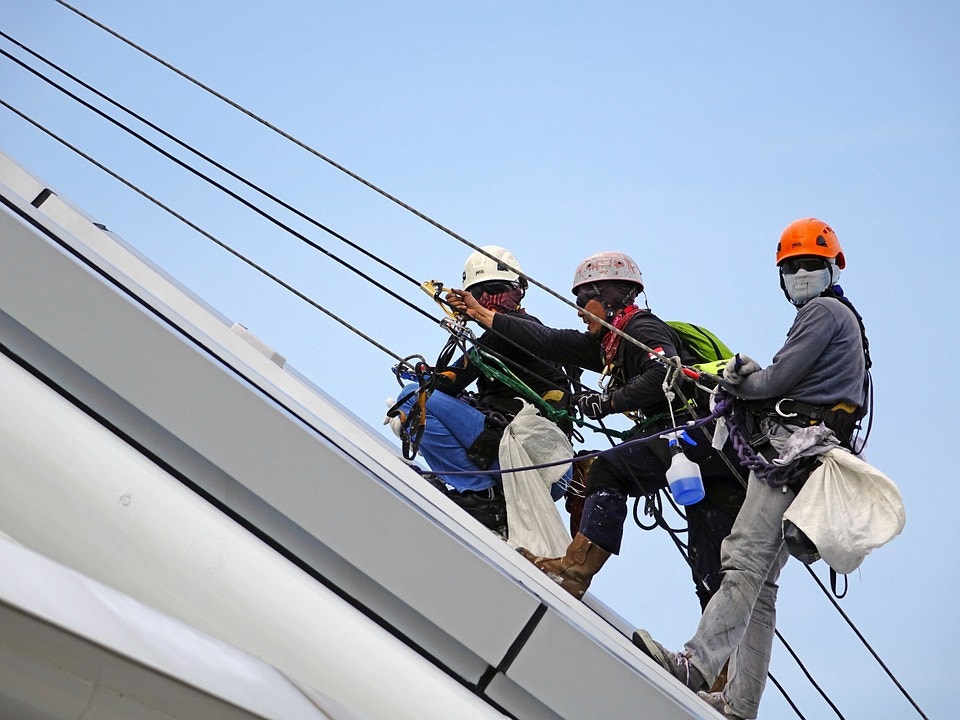5 Steps For Creating A Safe Workplace
- Nov 14, 2015
 We spend a lot of our time working, often much more than we'd like to. In fact, it's estimated that the average American spends a solid 11 years worth of time at work throughout their lifetime. With so much time spent, it's a good idea to do things as efficient as possible and a big part of that means working safely.
We spend a lot of our time working, often much more than we'd like to. In fact, it's estimated that the average American spends a solid 11 years worth of time at work throughout their lifetime. With so much time spent, it's a good idea to do things as efficient as possible and a big part of that means working safely. Whether you're an employee, manager or business owner, you should take the initiative to provide and maintain a safe working environment. Remember, this doesn't only apply to dangerous jobs or those more likely to be hazardous; it applies to any and all industries. Safety awareness helps avoid accidents, injury, death, and the risk of disastrous consequences from failure to practice proper safety procedure. Here are 5 steps that you can use to create a safer, more efficient workplace.
Know Your Hazards & Have a Plan
It doesn't matter whether you're working in a steel mill or a grocery store, there's always going to be safety hazards present. From heavy equipment and machinery to dangerous chemicals, working at heights, and avoiding slip & falls, it's best to be cautious of what could go wrong. If you're working in an office, you might think that nothing bad could happen, but does everyone know where the fire extinguisher is? Is everyone in the office aware of the circuit breaker's location in the event that an electrical fire started? Is there a standard procedure to follow if your business were to get robbed at gunpoint? There's a lot to consider and if you're not aware, informed and prepared when something happens, it could put yourself or others in harm's way.
Ask Everyone To Participate
If you're serious about safety, and I mean truly serious, than encourage your employees or co-workers to speak up. Nobody wants to be the bearer of bad news, looked down upon or afraid of retaliation or termination for coming forward about possible safety issues. In fact, that's exactly how many people feel they'll be perceived if they spoke up about their concerns, and this can be problematic. Encourage honestly and straightforward discussion when it comes to safety in the workplace. Make it clear that everyone is working together and if someone has a concern, they should voice it to the proper personnel. Often times there are serious safety hazards which go unmentioned and later cause serious harm or even death, solely because people are afraid to be seen as "the complaining employee" or "a threat to profits". Make it clear that safety is a priority in the operation of your workplace and ask that any and all concerns be voiced so they can be properly addressed.
Promote Group Safety
While some workers might take safety more seriously than others, it's important to stress that everyone is working as a team. Employees should understand that their own decisions in the workplace can directly or indirectly affect the safety of others. If one person cuts corners, it might raise the risk of an accident for everyone else and that's not fair. Promote group safety by asking everyone to lookout for one another in an non-invasive fashion. If everyone is responsible for the safety of others just as much as they're responsible for their own safety, it creates a reciprocal effect which results a safer working environment for everyone. When the safe way is the only way that work is carried out, it lowers the risk of accidents. Make it clear that employees are paid for their time and that safety needs to come first in all tasks and duties. Never criticize employees or co-workers for taking the extra time to complete a task safely - instead, encourage and praise it!
Provide The Proper Tools and Training
Performing hazardous tasks and duties can be extra dangerous without the proper training, tools and materials. Whatever may be needed to complete a job properly and safely should always be provided and/or required. That means proper training, proper equipment, proper maintenance, etc.. Sending your employees up on a broken ladder is no different than gambling but instead of gambling with your own money, you're gambling with the well being of another person. People who aren't properly trained cannot possibly be aware of the potential hazards that might exist, and this is often the root cause of many workplace injuries and deaths. Make sure the risks are clear, and that the proper steps are always taken to prevent them.
Offer Rewards for Good Safety Practice
The incentive doesn't have to be huge, but one easy way to help ensure proper safety practices is by offering a reward. Ideally, this works best when used as a group reward, because it puts each individual as a responsible party in the overall effort to meet a goal. The goals and rewards will depend on the work environment and job duties, but consider a quarterly reward that is only awarded when management doesn't see a single instance of unsafe practices on the job. If a single individual cuts corners or utilizes a less-than-safe method of completing a task, the reward is off for everyone. This can really push people to give their 110% effort at working as safe as possible. You'd be surprised how far a quarterly paid day off, company dinner or cash bonus can really go. It's much less of a price to pay than an injury or accident, and it promotes good safety ethics as a habit.

